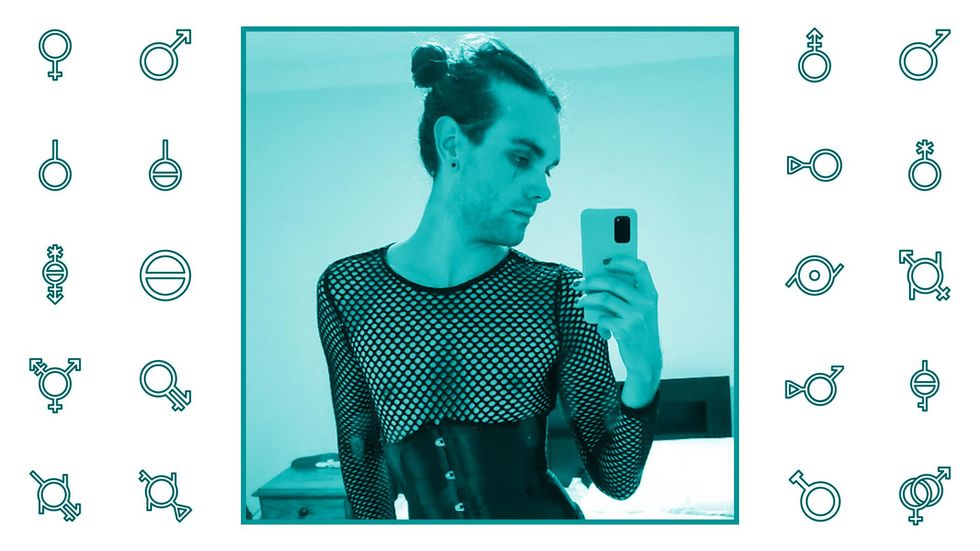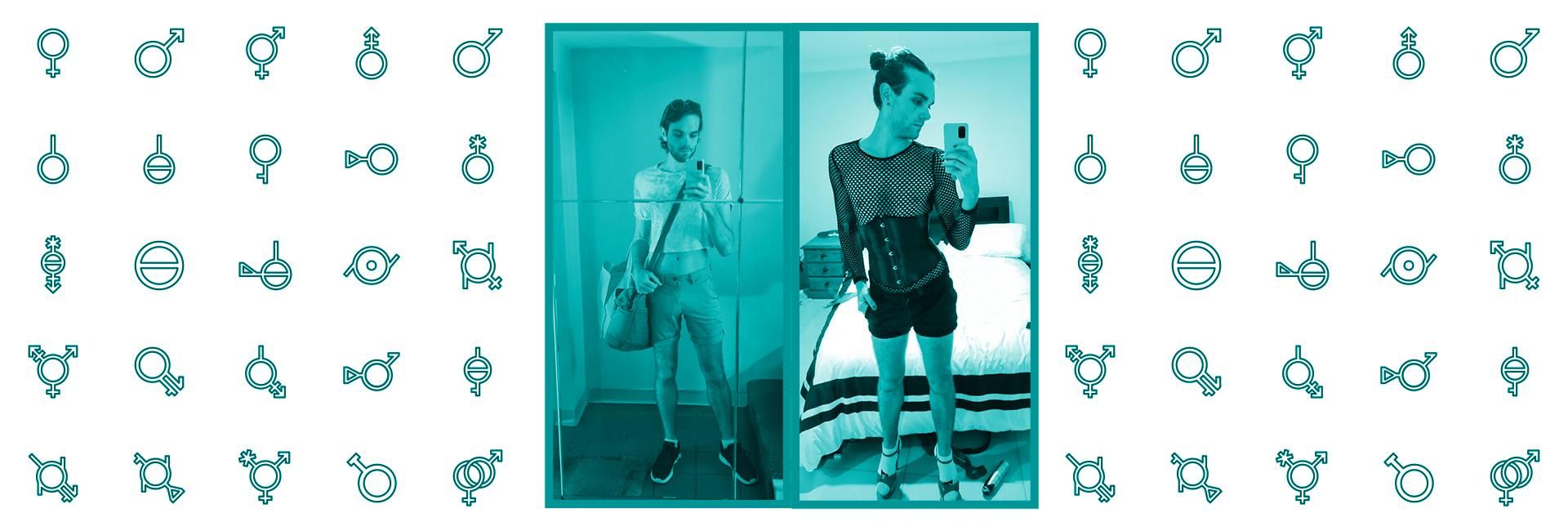As stereotypes go, you’d expect Kyle Dean to be that guy first in line to renounce He/Him pronouns but he doesn't think it’s that simple.
He/She, Him/Her, They: why do we need to nail down gender expression. I’m a guy, but for many, I do not fit within expectations of what a man "should" be, despite my genitalia. I am emotional and overly articulate with those emotions. My voice is squeakier and at a higher pitch than is desirable for a male lead in a romantic comedy, never mind an action movie.
I wear nail polish and eye liner. I've run around in heels for fun (and then wondered why anyone would willingly spend a night in heels. Good looking calves be damned!). I wear crop tops outside. I’ve permed my growing hair (twice) to fulfil my life ambition of having hair with volume. The only thing stopping me from rocking pleated skirts is the aesthetic clash between the pleat and my hairy legs (I like my hairy legs more).
At a young age I was teased for being a dancer and roleplaying as Jean Grey or Storm from X-Men because I truly believed, and still do, they have better powers than Cyclops and Wolverine. As stereotypes go, you’d expect I would be that guy first in line to renounce He/Him pronouns and the confines of male gender expression. But I don’t think it’s that simple.
Full Disclaimer: I am not bothered how you individually move around the world. If asked to use They/Them pronouns, I will use them and I will respect your non-binary genderism (often more consistently than those who claim to champion non-binary issues).
When men and women go against social norms by her not shaving body hair or he donning make-up, they make a powerful challenge to harmful gender-coded systems.
I'm genuinely curious about different people's experiences and how we all get along as a social and global community. However, I don't agree with the culture that says because I don't identify as non-binary, I therefore cannot critique it. Change starts with hearts and minds, not shaming or policing, and hearts and minds cannot be changed if there is no space to assess the relative merits of different arguments.
To me, non-binary genderism is in an identity mostly defined by what it's not, an identity too vast to pin down, to be understood by outsiders. The argument I hear most often for choosing the "They/Them" pronoun is "Because I say so" and "Because I feel it".
The core reason I am always given for people identifying with non-binary genders is to push back against societal gender norms, and I am very concerned that by rejecting a gender binary, we unintentionally reinforce its worst aspects. Will non-binary genderism become a new straight jacket? While some, like me, may not fit into the abstract box the biological sex assigned them, I have to wonder if the advocates of non-binary genderism have considered that gender expression has swung wildly in the past and will shift again in the future. The question becomes in what way might it change again?
My argument isn’t popular. When they say "You don't get it. It's something innate", I have to push back. Not belonging is a feeling I understand well. I have found many men across the identity spectrum who share my more "feminine" characteristics. They too crave connection with men who experience the world as they do.

What this reminds me of is that people make culture, not the other way around. Prince, David Bowie and Cher are seen as trail blazers and pioneers for bending and breaking gender norms. They are lauded for how they upended those norms, yet they still identify within the social binary gender structure.
For all the praise society heaps on them, we struggle to emulate them. They haven't required new labels or definitions to explore and express the blend of what is typically called masculinity and femininity. Just because, sociologically, we are more likely to find traits in one sex over the other does not mean that a characteristic can only be found in one sex. I don't believe my more "feminine" qualities make me any less of a man. I'm just pushing against sociological expectation and in doing so have found others who want to do the same.
This brings me to the crux of my concern about pronouns. The existence and use of the non-binary "they/them" reinforces all the things we are told to hate about the gender binary: toxic masculinity, unrealistic female beauty standards, imbalanced power distribution, expected behavioural and emotional expressions.
Having a space in between he and she that has its own label implies this space is beyond the very binary-focussed problems I’ve listed. It puts focus on the “he” and “she” aspects of those issues rather than acknowledging that everyone (he, she, they) has a role to play in them. Rather than embrace a new non-binary space, it would be more effective to expand the definitions of “he” behaviour and “she” behaviour in dealing with these issues.
If we say men who identify as non-binary are more likely to be in touch with their emotions, this perpetuates the notion that binary men are not in touch with their emotions and legitimises the emotional avoidance seen in toxic masculinity.
All these binary issues are reinforced because they are not being actively challenged within our society and within the binary gender structure.
Staking out a third exclusive space of gender expression, between masculinity and femininity, limits or excludes access to that space for the person who is comfortable identifying their sex and gender as one but does not conform to the social norm of how that will look. Unless I am willing to jump on board with identifying as non-binary, the third undefined and increasingly expansive “other” offers little inclusion for me as a social norm.
Why should the new expectation be that you have to change your pronouns to avoid being questioned on your personal style and expression? The thing with creating new subdivisions and subcategories is they eventually splinter and factions are pitted against each other. Even now, in the midst of the nondescript nebulous other that is non-binary genderism, the seeds of division to further subdivide and categorise are coalescing.
New expectations and requirements are established around validity, justification and "proof" will be required. “Proof” which will always be defined by other people. How long until someone saying they identify as non-binary is questioned not by their cisgendered peers, but by others who use their non-binary gender identity to confront societal gender norms? “I do x, y and z to show my non-binary genderism, what do you do? Why aren’t you doing the same?” In trying to include greater diversity in expression, we are unintentionally locking ourselves into tinier and more regimented boxes.
I don't challenge the direction of non-binary genderism to create further hurt in a community already under fire from ugly culture warriors looking to score political points. I do so because I think there is another solution, one which, despite being more difficult to achieve, would work better for Western societies. My solution would help unravel the toxic traits of gender norms that the non-binary gender movement is fighting and avoid offering up new identity targets to be challenged (and brutalised) by the culture warriors.
My solution, as anti-climactic as it seems, to achieve a truly inclusive and progressive world is to, at one and the same time, reshape the mould of gender norms and apply pronoun usage on the basis of sex. This would ensure personal expression without prejudice. Some people will be wrongly pronoun-ed, but if there's no shame around how we express ourselves as either sex, the power of the pronoun is drained away. No matter your genitalia, express yourself however you want. Break masculine and feminine norms and redefine them to be something we can all agree, or agree to disagree, on.
Let behaviour and expression be captured accurately rather than described in some cheap, insulting shorthand. A woman wearing a pantsuit doesn’t have to be a "power play" as per masculine norms; it may be that she simply doesn't like skirts. Men might wear dresses (designed, not for a woman, but to fit a man’s breastless physiology) because legs get hot and some men have great legs.
When men and women go against their current social norms by her not shaving body hair, or he donning make-up for a night out, they make a powerful challenge to harmful gender-coded systems. Changing attitudes will build long-term inclusion much more effectively than creating a label that is so murky, many of us won't know if we qualify.






